Vegetarianism Could Save the Planet: A Discussion
VerifiedAdded on 2023/06/10
|7
|1047
|150
AI Summary
This research essay discusses the impact of vegetarianism on the environment, specifically in reducing GHG emissions, increasing agricultural land, and reducing soil erosion. It presents counter-arguments and refutations, and concludes that while vegetarianism can bring significant benefits, more environment-friendly ways to raise livestock should be developed.
Contribute Materials
Your contribution can guide someone’s learning journey. Share your
documents today.
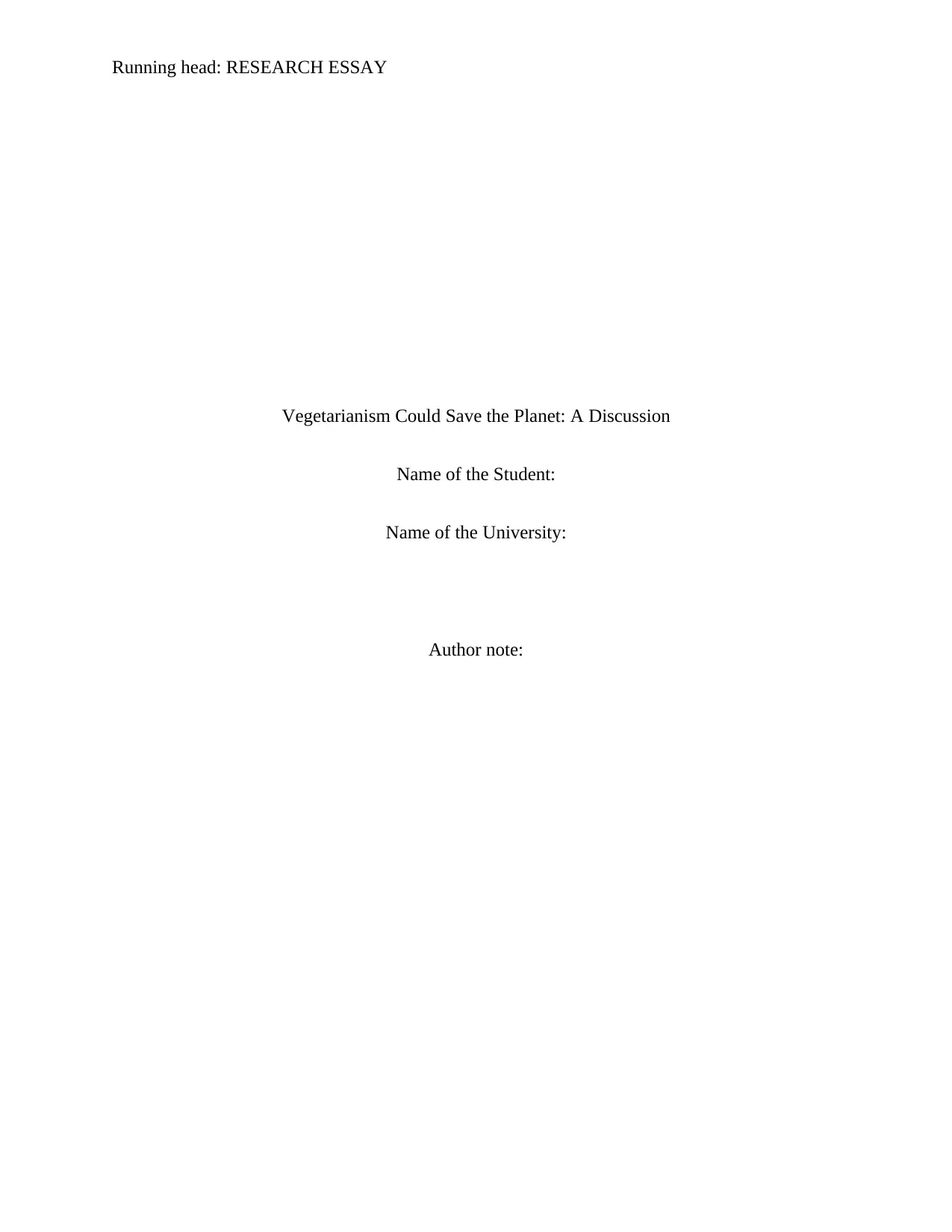
Running head: RESEARCH ESSAY
Vegetarianism Could Save the Planet: A Discussion
Name of the Student:
Name of the University:
Author note:
Vegetarianism Could Save the Planet: A Discussion
Name of the Student:
Name of the University:
Author note:
Secure Best Marks with AI Grader
Need help grading? Try our AI Grader for instant feedback on your assignments.
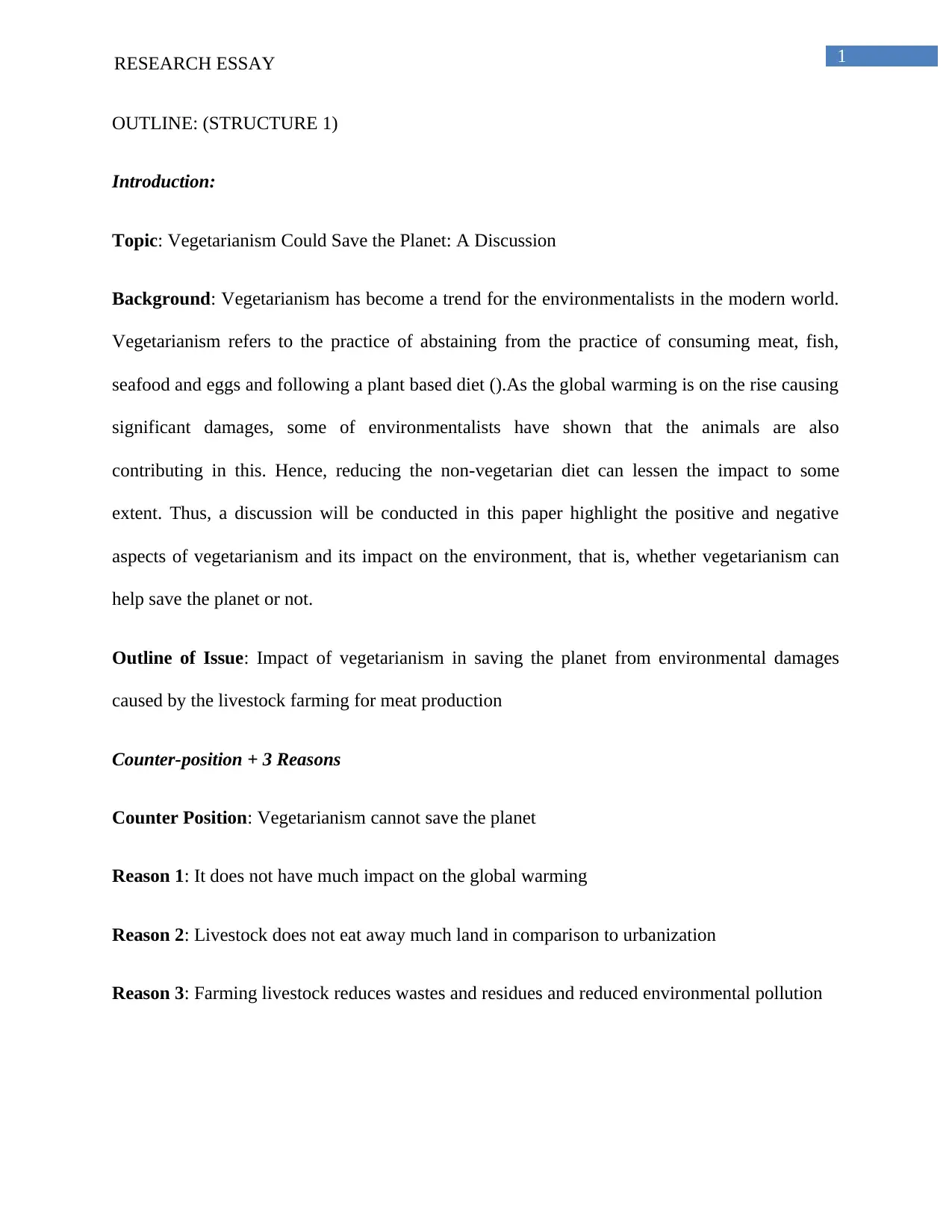
1RESEARCH ESSAY
OUTLINE: (STRUCTURE 1)
Introduction:
Topic: Vegetarianism Could Save the Planet: A Discussion
Background: Vegetarianism has become a trend for the environmentalists in the modern world.
Vegetarianism refers to the practice of abstaining from the practice of consuming meat, fish,
seafood and eggs and following a plant based diet ().As the global warming is on the rise causing
significant damages, some of environmentalists have shown that the animals are also
contributing in this. Hence, reducing the non-vegetarian diet can lessen the impact to some
extent. Thus, a discussion will be conducted in this paper highlight the positive and negative
aspects of vegetarianism and its impact on the environment, that is, whether vegetarianism can
help save the planet or not.
Outline of Issue: Impact of vegetarianism in saving the planet from environmental damages
caused by the livestock farming for meat production
Counter-position + 3 Reasons
Counter Position: Vegetarianism cannot save the planet
Reason 1: It does not have much impact on the global warming
Reason 2: Livestock does not eat away much land in comparison to urbanization
Reason 3: Farming livestock reduces wastes and residues and reduced environmental pollution
OUTLINE: (STRUCTURE 1)
Introduction:
Topic: Vegetarianism Could Save the Planet: A Discussion
Background: Vegetarianism has become a trend for the environmentalists in the modern world.
Vegetarianism refers to the practice of abstaining from the practice of consuming meat, fish,
seafood and eggs and following a plant based diet ().As the global warming is on the rise causing
significant damages, some of environmentalists have shown that the animals are also
contributing in this. Hence, reducing the non-vegetarian diet can lessen the impact to some
extent. Thus, a discussion will be conducted in this paper highlight the positive and negative
aspects of vegetarianism and its impact on the environment, that is, whether vegetarianism can
help save the planet or not.
Outline of Issue: Impact of vegetarianism in saving the planet from environmental damages
caused by the livestock farming for meat production
Counter-position + 3 Reasons
Counter Position: Vegetarianism cannot save the planet
Reason 1: It does not have much impact on the global warming
Reason 2: Livestock does not eat away much land in comparison to urbanization
Reason 3: Farming livestock reduces wastes and residues and reduced environmental pollution
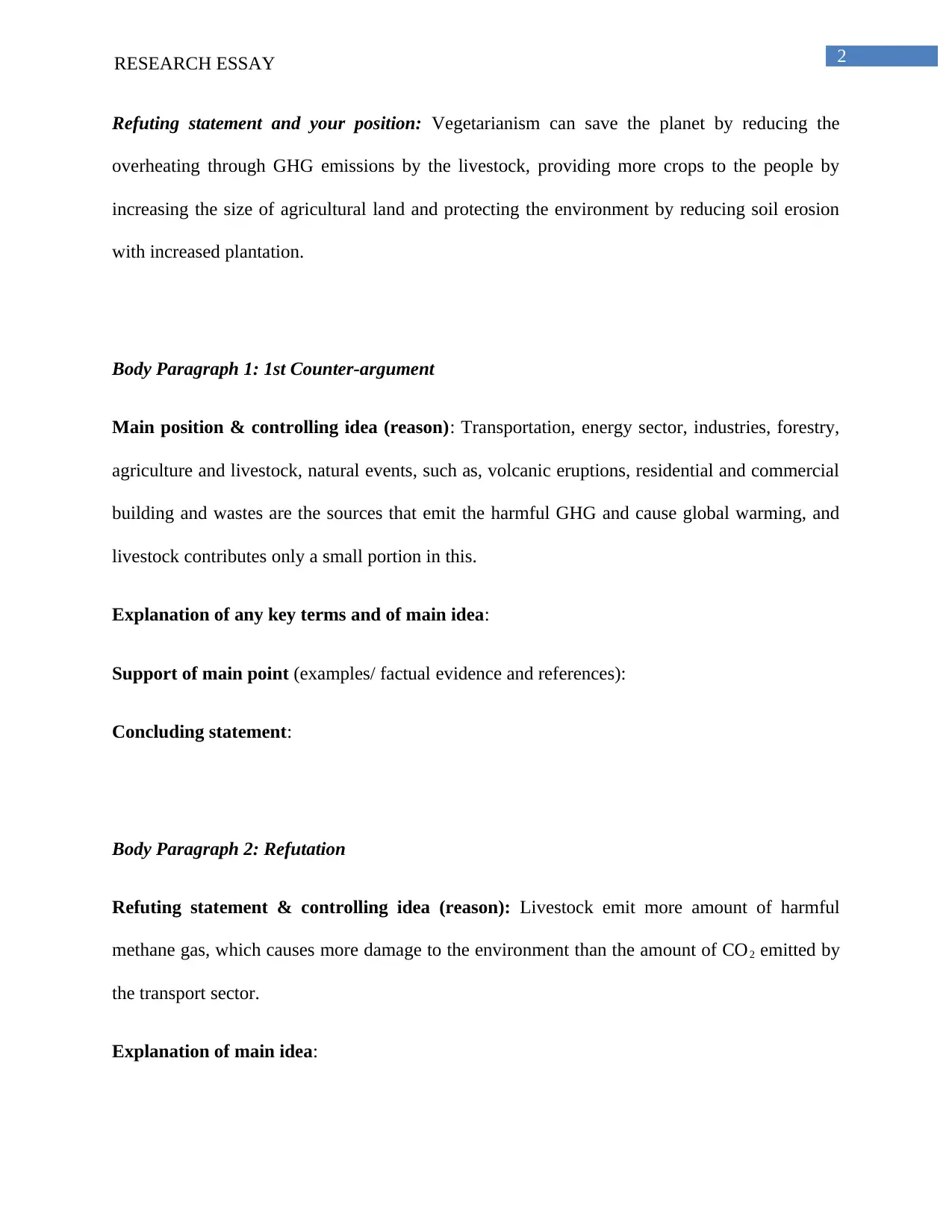
2RESEARCH ESSAY
Refuting statement and your position: Vegetarianism can save the planet by reducing the
overheating through GHG emissions by the livestock, providing more crops to the people by
increasing the size of agricultural land and protecting the environment by reducing soil erosion
with increased plantation.
Body Paragraph 1: 1st Counter-argument
Main position & controlling idea (reason): Transportation, energy sector, industries, forestry,
agriculture and livestock, natural events, such as, volcanic eruptions, residential and commercial
building and wastes are the sources that emit the harmful GHG and cause global warming, and
livestock contributes only a small portion in this.
Explanation of any key terms and of main idea:
Support of main point (examples/ factual evidence and references):
Concluding statement:
Body Paragraph 2: Refutation
Refuting statement & controlling idea (reason): Livestock emit more amount of harmful
methane gas, which causes more damage to the environment than the amount of CO2 emitted by
the transport sector.
Explanation of main idea:
Refuting statement and your position: Vegetarianism can save the planet by reducing the
overheating through GHG emissions by the livestock, providing more crops to the people by
increasing the size of agricultural land and protecting the environment by reducing soil erosion
with increased plantation.
Body Paragraph 1: 1st Counter-argument
Main position & controlling idea (reason): Transportation, energy sector, industries, forestry,
agriculture and livestock, natural events, such as, volcanic eruptions, residential and commercial
building and wastes are the sources that emit the harmful GHG and cause global warming, and
livestock contributes only a small portion in this.
Explanation of any key terms and of main idea:
Support of main point (examples/ factual evidence and references):
Concluding statement:
Body Paragraph 2: Refutation
Refuting statement & controlling idea (reason): Livestock emit more amount of harmful
methane gas, which causes more damage to the environment than the amount of CO2 emitted by
the transport sector.
Explanation of main idea:
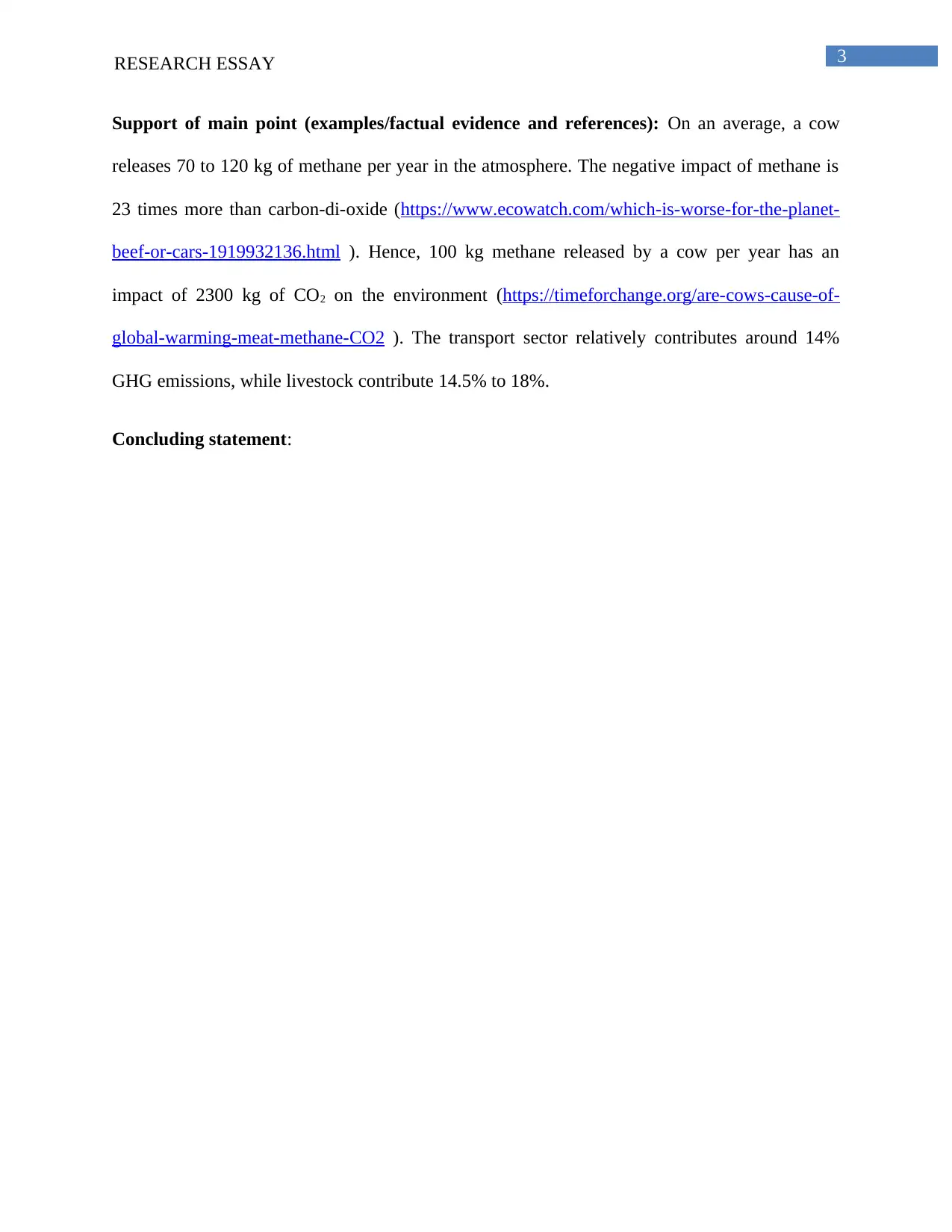
3RESEARCH ESSAY
Support of main point (examples/factual evidence and references): On an average, a cow
releases 70 to 120 kg of methane per year in the atmosphere. The negative impact of methane is
23 times more than carbon-di-oxide (https://www.ecowatch.com/which-is-worse-for-the-planet-
beef-or-cars-1919932136.html ). Hence, 100 kg methane released by a cow per year has an
impact of 2300 kg of CO2 on the environment (https://timeforchange.org/are-cows-cause-of-
global-warming-meat-methane-CO2 ). The transport sector relatively contributes around 14%
GHG emissions, while livestock contribute 14.5% to 18%.
Concluding statement:
Support of main point (examples/factual evidence and references): On an average, a cow
releases 70 to 120 kg of methane per year in the atmosphere. The negative impact of methane is
23 times more than carbon-di-oxide (https://www.ecowatch.com/which-is-worse-for-the-planet-
beef-or-cars-1919932136.html ). Hence, 100 kg methane released by a cow per year has an
impact of 2300 kg of CO2 on the environment (https://timeforchange.org/are-cows-cause-of-
global-warming-meat-methane-CO2 ). The transport sector relatively contributes around 14%
GHG emissions, while livestock contribute 14.5% to 18%.
Concluding statement:
Secure Best Marks with AI Grader
Need help grading? Try our AI Grader for instant feedback on your assignments.
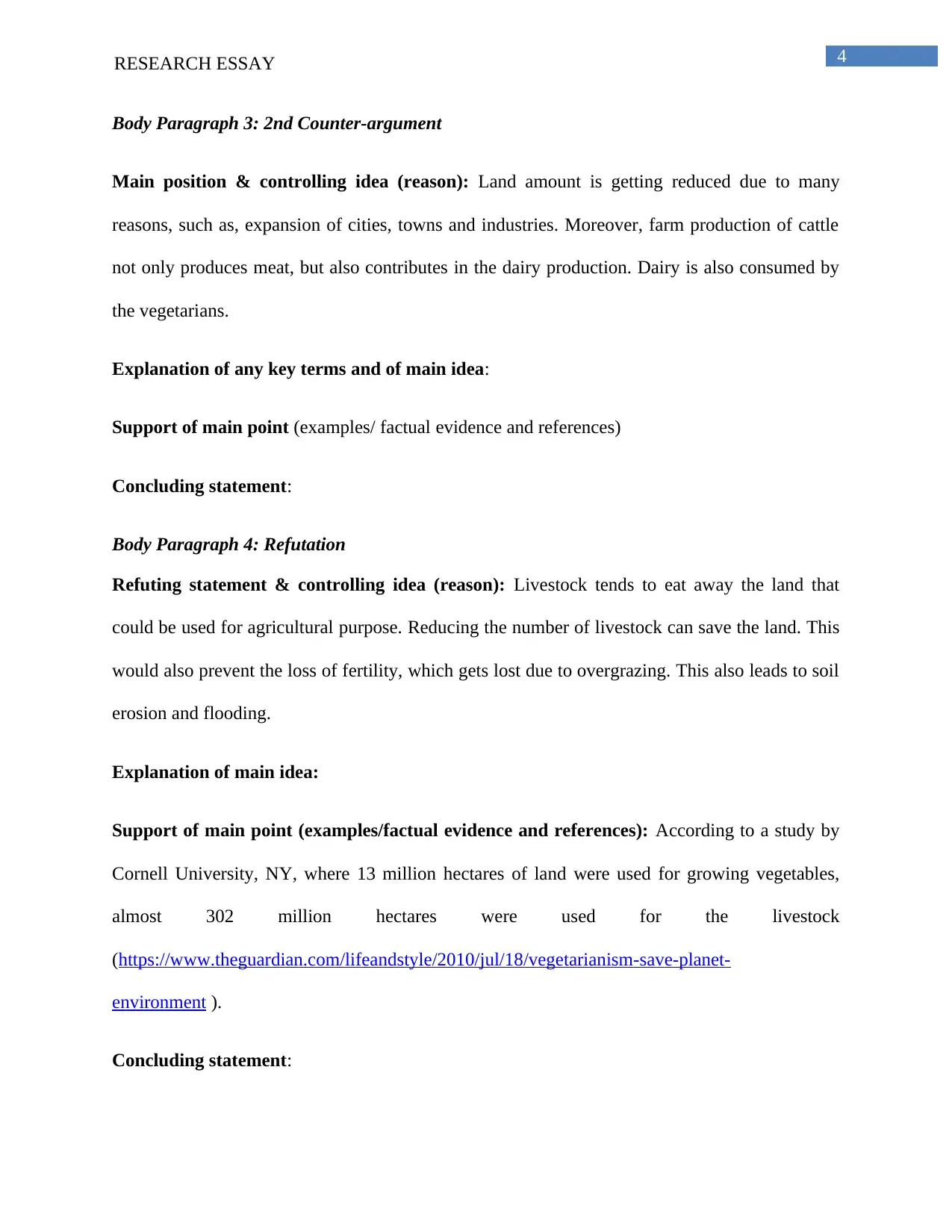
4RESEARCH ESSAY
Body Paragraph 3: 2nd Counter-argument
Main position & controlling idea (reason): Land amount is getting reduced due to many
reasons, such as, expansion of cities, towns and industries. Moreover, farm production of cattle
not only produces meat, but also contributes in the dairy production. Dairy is also consumed by
the vegetarians.
Explanation of any key terms and of main idea:
Support of main point (examples/ factual evidence and references)
Concluding statement:
Body Paragraph 4: Refutation
Refuting statement & controlling idea (reason): Livestock tends to eat away the land that
could be used for agricultural purpose. Reducing the number of livestock can save the land. This
would also prevent the loss of fertility, which gets lost due to overgrazing. This also leads to soil
erosion and flooding.
Explanation of main idea:
Support of main point (examples/factual evidence and references): According to a study by
Cornell University, NY, where 13 million hectares of land were used for growing vegetables,
almost 302 million hectares were used for the livestock
(https://www.theguardian.com/lifeandstyle/2010/jul/18/vegetarianism-save-planet-
environment ).
Concluding statement:
Body Paragraph 3: 2nd Counter-argument
Main position & controlling idea (reason): Land amount is getting reduced due to many
reasons, such as, expansion of cities, towns and industries. Moreover, farm production of cattle
not only produces meat, but also contributes in the dairy production. Dairy is also consumed by
the vegetarians.
Explanation of any key terms and of main idea:
Support of main point (examples/ factual evidence and references)
Concluding statement:
Body Paragraph 4: Refutation
Refuting statement & controlling idea (reason): Livestock tends to eat away the land that
could be used for agricultural purpose. Reducing the number of livestock can save the land. This
would also prevent the loss of fertility, which gets lost due to overgrazing. This also leads to soil
erosion and flooding.
Explanation of main idea:
Support of main point (examples/factual evidence and references): According to a study by
Cornell University, NY, where 13 million hectares of land were used for growing vegetables,
almost 302 million hectares were used for the livestock
(https://www.theguardian.com/lifeandstyle/2010/jul/18/vegetarianism-save-planet-
environment ).
Concluding statement:
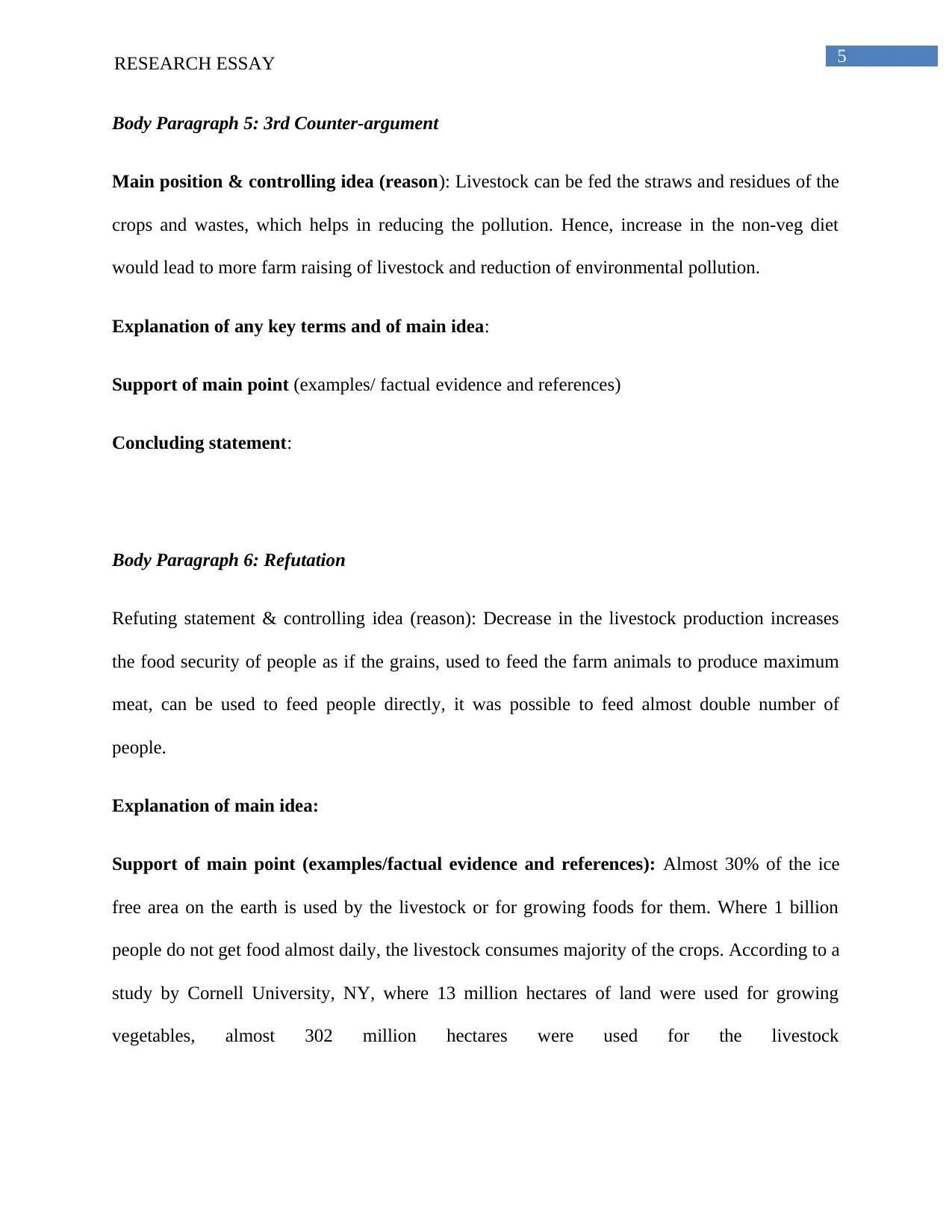
5RESEARCH ESSAY
Body Paragraph 5: 3rd Counter-argument
Main position & controlling idea (reason): Livestock can be fed the straws and residues of the
crops and wastes, which helps in reducing the pollution. Hence, increase in the non-veg diet
would lead to more farm raising of livestock and reduction of environmental pollution.
Explanation of any key terms and of main idea:
Support of main point (examples/ factual evidence and references)
Concluding statement:
Body Paragraph 6: Refutation
Refuting statement & controlling idea (reason): Decrease in the livestock production increases
the food security of people as if the grains, used to feed the farm animals to produce maximum
meat, can be used to feed people directly, it was possible to feed almost double number of
people.
Explanation of main idea:
Support of main point (examples/factual evidence and references): Almost 30% of the ice
free area on the earth is used by the livestock or for growing foods for them. Where 1 billion
people do not get food almost daily, the livestock consumes majority of the crops. According to a
study by Cornell University, NY, where 13 million hectares of land were used for growing
vegetables, almost 302 million hectares were used for the livestock
Body Paragraph 5: 3rd Counter-argument
Main position & controlling idea (reason): Livestock can be fed the straws and residues of the
crops and wastes, which helps in reducing the pollution. Hence, increase in the non-veg diet
would lead to more farm raising of livestock and reduction of environmental pollution.
Explanation of any key terms and of main idea:
Support of main point (examples/ factual evidence and references)
Concluding statement:
Body Paragraph 6: Refutation
Refuting statement & controlling idea (reason): Decrease in the livestock production increases
the food security of people as if the grains, used to feed the farm animals to produce maximum
meat, can be used to feed people directly, it was possible to feed almost double number of
people.
Explanation of main idea:
Support of main point (examples/factual evidence and references): Almost 30% of the ice
free area on the earth is used by the livestock or for growing foods for them. Where 1 billion
people do not get food almost daily, the livestock consumes majority of the crops. According to a
study by Cornell University, NY, where 13 million hectares of land were used for growing
vegetables, almost 302 million hectares were used for the livestock
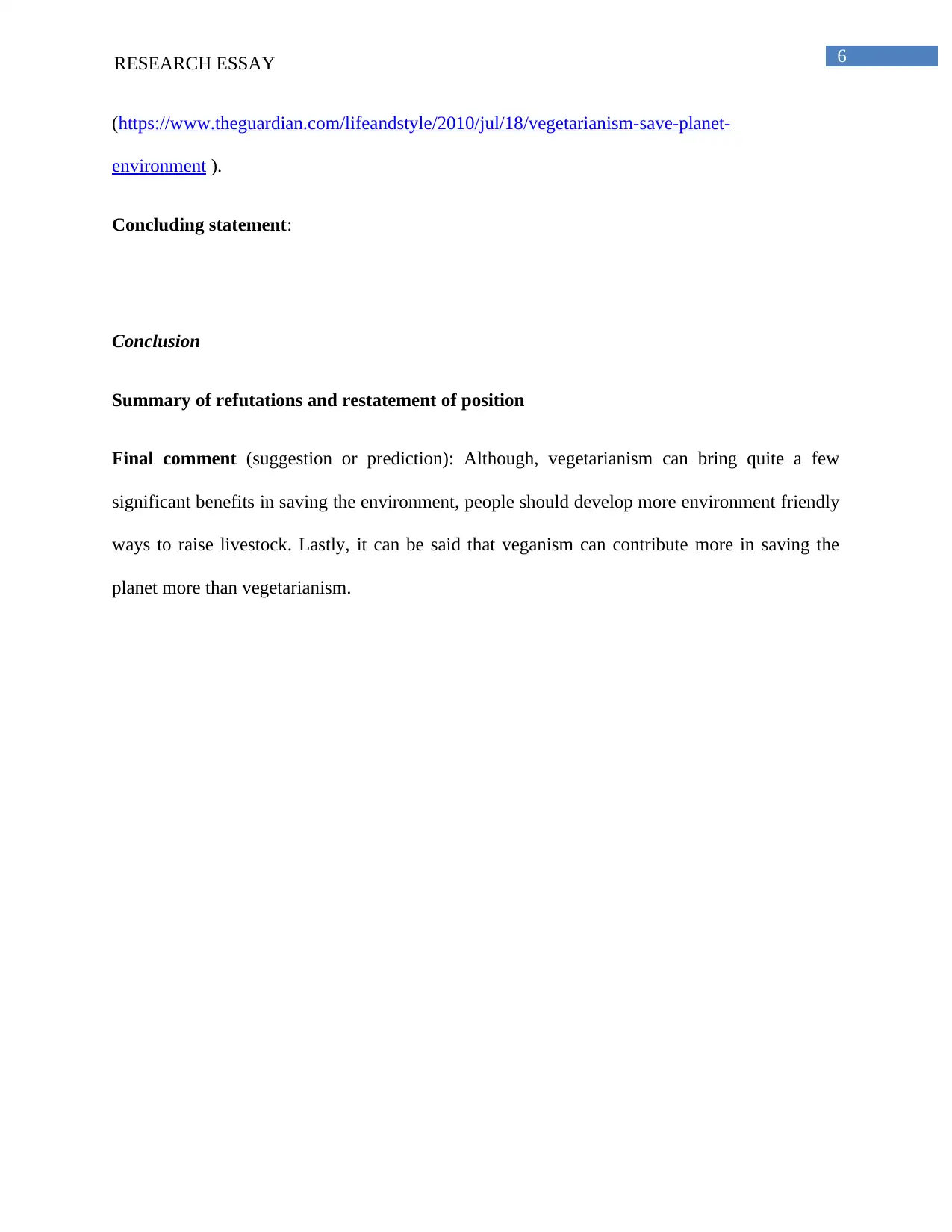
6RESEARCH ESSAY
(https://www.theguardian.com/lifeandstyle/2010/jul/18/vegetarianism-save-planet-
environment ).
Concluding statement:
Conclusion
Summary of refutations and restatement of position
Final comment (suggestion or prediction): Although, vegetarianism can bring quite a few
significant benefits in saving the environment, people should develop more environment friendly
ways to raise livestock. Lastly, it can be said that veganism can contribute more in saving the
planet more than vegetarianism.
(https://www.theguardian.com/lifeandstyle/2010/jul/18/vegetarianism-save-planet-
environment ).
Concluding statement:
Conclusion
Summary of refutations and restatement of position
Final comment (suggestion or prediction): Although, vegetarianism can bring quite a few
significant benefits in saving the environment, people should develop more environment friendly
ways to raise livestock. Lastly, it can be said that veganism can contribute more in saving the
planet more than vegetarianism.
1 out of 7
Your All-in-One AI-Powered Toolkit for Academic Success.
+13062052269
info@desklib.com
Available 24*7 on WhatsApp / Email
![[object Object]](/_next/static/media/star-bottom.7253800d.svg)
Unlock your academic potential
© 2024 | Zucol Services PVT LTD | All rights reserved.